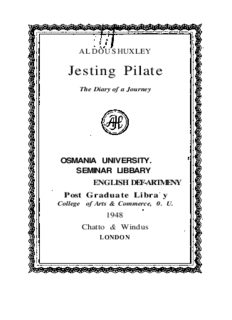
Jesting Pilate PDF
Preview Jesting Pilate
ALDOUS HUXLEY Jesting Pilate The Diary of a Journey OSMANIA UNIVERSITY. SEMINAR LIBBARY ENGLISH DEF-ARTMENY Post Graduate Libra y College of Arts & Commerce, 0. U. 1948 Chatto & Windus LONDON PUBLISHED BY Chatto & Windus LOND0N Oxford University Press TORONTO Applications regarding translation rights in any- work by Aldous Huxley should be addressed to Chatto & Windus, 40 WQliam^Av Street, London, W FIRST PUBLISHED 1926 FIRST ISSUED IN THIS COLLECTED EDITION I948 PRINTED IN GREAT BRITAIN ALL RIGHTS RESERVED CONTENTS Part l: INDIA AND BURMA Page i II : MALAYA 173 l l l: THE PACIFIC 239 iv: AMERICA 257 ILLUSTRATIONS facing page SHALIMAR GARDENS, LAHORE 48 KUTB MINAR, DELHI AUDIENCE HALL, AGRA FORT 49 FATEHPUR SIKRI 64 GATE OF VICTORY, FATEHPUR SIKRI ELEPHANT, JAIPUR 65 PUSHKAR LAKE 80 SCULPTURES, CHITOR 81 HINDU ARCHITECTURE, DETAIL 96 JAISAMAND, THE DAM JAISAMAND LAKE, UDAIPUR 97 BENARES, BATHERS 144 BENARES, THE CROWD 145 SHWE DAGON PAGODA, RANGOON 160 CHINESE WOMAN, BHAMO COLOSSAL DRAGON, PROME 161 JESTING PILATE facing page JUNGLE, SANDAKAN FOREST CLEARED FOR RUBBER, SANDAKAN 224 TYPICAL SKYLINE, JAVA JAVANESE VILLAGE 225 CANOES WITH OUTRIGGERS, SULU LOADING COCONUTS, Z A M B O A N G A 2 40 GRAND CANYON, COLORADO NEW YORK 241 INDIA & BURMA TORT SAID T HE after-hatch was off. Hung high above the opening, the electric lights glared down into the deep square well of the hold. The watcher, leaning over the brink of the well, shouted and waved his arms. The donkey-engine rattled responsively. Twenty sacks of potatoes came rushing up from the depths. Ten feet above the level of the deck, they were swung sideways by the transverse pull of a second rope, hung suspended for a moment beyond the gunwale, then, at another signal from the watcher, dropped down into the waiting lighter. The watcher raised his hand again ; again the engine rattled. Two empty loops of rope came up over the ship's side, whipped across the deck and went down, writhing like living snakes, into the well. At the bottom, far down, little men caught at the trailing ropes, piled up the sacks, made fast. The watcher shouted. Yet another quintal of potatoes came rushing up, swung sideways, dropped out of sight over the edge of the ship. And so it continued, all the night. Curiously, admiringly, and at last with a growing sense of horror, I looked on. Moving bits of matter from one point of the world's surface to another—man's whole activity. And the wisdom of the East, I reflected, consists in the affirmation that it is better to leave the bits of matter where they are. Up to a point, no doubt, the sages of the East are right. There are many bits of matter which might be left in their place and nobody would be any the worse. These particles of ink, for example, which I so laboriously transfer from their bottle to the surface of the paper. . • • 3 JESTING P I L A TE We landed—in what a sink ! At Port Said they speak all languages, accept every currency. But their exchange is robbery and they employ their gift of tongues only for cheating. The staple industry of the place seems to be the manufacture and sale of indecent photographs. They are stocked in almost every shop ; they are pressed upon you—at prices that decline astonishingly, as you walk away, from a sovereign to half a crown— by every loafer. The copiousness of the supply is proof of a correspondingly large demand for these wares by passing travellers. In these matters, it seems, many people are more agreeably excited by the representation—whether pictorial or verbal— than by carnal reality. It is a curious psychological fact, for which I can find no complete explanation. IN THE RED SEA TALKING with Europeans who live and work in the East,l find that, if they love the East (which they mostly do), it is always for the same reason. In the East, they say, a man is somebody ; he has authority and is looked up to ; he knows all the people who matter and is known. At home, he is lost in the crowd, he does not count, he is nobody. Life in the East satisfies the profoundest and most powerful of all the instincts—that of self-assertion. The young man who goes out from a London suburb to take up a clerkship in India finds himself a member of a small ruling community ; he has slavish servants to order about, dark-skinned sub ordinates to whom it is right and proper to be rude. 4
